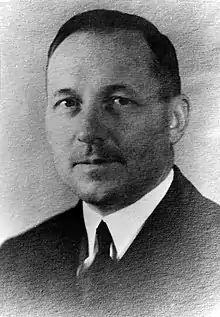Mervyn Sharp Bennion | |
|---|---|
 | |
| Born | May 5, 1887 Vernon, Utah Territory |
| Died | December 7, 1941 (aged 54) Pearl Harbor, Territory of Hawaii |
| Place of burial | Salt Lake City Cemetery, Salt Lake City, Utah |
| Allegiance | United States of America |
| Service/ | |
| Years of service | 1910-1941 |
| Rank | |
| Commands held | USS Bernadou (DD-153) Destroyer Division One USS West Virginia (BB-48) |
| Battles/wars | World War I World War II |
| Awards | |
Mervyn Sharp Bennion (May 5, 1887 – December 7, 1941) was a United States Navy captain who served during World War I and was killed while he was in command of battleship USS West Virginia during the Japanese attack on Pearl Harbor in World War II. He posthumously received the Medal of Honor for "conspicuous devotion to duty, extraordinary courage, and complete disregard of his own life."
Family background
Bennion was born in Vernon, Utah Territory on May 5, 1887. The religion of the family, which he shared, was the Church of Jesus Christ of Latter-day Saints. His Welsh grandfather, John Bennion, had immigrated to Utah with the Mormon pioneers and established successful cattle operations near Taylorsville, Utah. Bennion was living near Preston, Idaho when he received his acceptance to the United States Naval Academy. Bennion graduated third in his 1910 class from the academy. His younger brother Howard Bennion graduated first in his class of 1912 at the United States Military Academy.
Naval career
Bennion's first assignment after graduation was on the USS California in the engineering division.[1] Subsequently, he was an ordnance and gunnery specialist serving in the Ordnance Bureau at Washington Navy Yard during World War I. Bennion's first command was the destroyer USS Bernadou, followed by command of Destroyer Division One. He assumed command of the USS West Virginia on July 2, 1941.
Bennion was killed in action during the Japanese attack on Pearl Harbor, December 7, 1941, while in command of the battleship USS West Virginia. He was mortally wounded by a shrapnel shard from the nearby USS Tennessee after she was hit by a bomb. Mess Attendant Second Class Doris Miller and several other sailors attempted to move Captain Bennion to a first aid station, but he refused to leave his post, eventually ordering his men to leave him and save themselves. Using one arm to hold his wounds closed, he died from loss of blood while still commanding his crew.[2] Bennion was posthumously awarded the Medal of Honor.
Bennion is buried in the Salt Lake City Cemetery. On July 4, 1943, the destroyer USS Bennion (DD-662), named in his honor, was christened by his widow.
Awards and honors
Medal of Honor citation
Bennion's Medal of Honor citation reads:

- For conspicuous devotion to duty, extraordinary courage, and complete disregard of his own life, above and beyond the call of duty, during the attack on the Fleet in Pearl Harbor, by Japanese forces on 7 December 1941. As Commanding Officer of the USS West Virginia, after being mortally wounded, Capt. Bennion evidenced apparent concern only in fighting and saving his ship, and strongly protested against being carried from the bridge.[upper-alpha 1]
See also
Notes and references
Notes
- ↑ Despite his grave injuries, he continued at his post trying to manage the situation. He was posthumously awarded the Medal of Honor. His conduct is regularly cited in training as the epitome of proper command deportment under fire.[3]
Citations
- ↑ "Biographical Sketch of Mervyn S. Bennion". www.usswestvirginia.org. Retrieved 2021-08-30.
- ↑ "USS West Virginia". United States Navy. Archived from the original on 2009-08-08. Retrieved 2009-07-24.
- ↑ Mink, Michael (December 4, 2015). "Leaders & Success: Mervyn Bennion Stood Tall To The End At Pearl Harbor". Investor's Business Daily. Retrieved December 4, 2015.
General sources
- Sherman L. Fleek, Saints of Valor: Mormon Medal of Honor Recipients, (Salt Lake City: Greg Kofford Books) 2013, chapter 2.
- "Bennion". Dictionary of American Naval Fighting Ships. Naval History & Heritage Command, Department of the Navy. Archived from the original on 2006-07-21. Retrieved 2005-11-17.
- "Bennion, Mervyn Sharp". US People. Naval History & Heritage Command, Department of the Navy. Retrieved 2006-11-05.
- "Mervyn S. Bennion, Captain, USS West Virginia, 1941". USSWestVirginia.org. Retrieved 2007-07-31.
- "Bennion Family History". history.utah.gov. Archived from the original on May 13, 2008. Retrieved 2007-03-08.
Attribution
This article incorporates text from the public domain Dictionary of American Naval Fighting Ships.